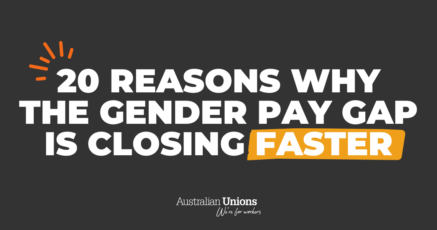Step aside Great Resignation, there’s a new work culture trend in town.
‘Quiet quitting’ is sidling into Australian workplaces but, despite its label, the concept has nothing to do with leaving your job.
Instead, by engaging in quiet quitting, workers are pushing back against a toxic hustle culture that glorifies unpaid overtime, leads to bad mental health, and perpetuates the sexist gender pay gap.
But before you get too excited and decide to start quiet quitting tomorrow, give your union a call so you know what you’re getting into. We also have a few suggestions for better ways you can push back without getting into trouble – so stay tuned.
Quiet quitting is simply doing your job
And nothing more. That’s the whole point. Quiet quitting is when you do the “bare minimum” at work. Or, in other words, do only what you are paid to do.
If we think about it, this new concept is just the latest expression of what workers have been doing for over 100 years.
It’s an attempt from workers to grasp back control where the dog-eat-dog hustle to get a promotion or prove your worth leads to burnout and a massive amount of unpaid labour.
While quiet quitting is trending on social media, there are better ways of progressing your career without sticking it out on your own (we’ll get to those tactics later).
The significance of quiet quitting is not so much the act itself but what it pushes against.
The trend comes at a time when Australians are increasingly more likely to be working multiple jobs to make ends meet. Part of hustle culture is having a ‘side hustle’ – or secondary job – to earn much-needed extra income in the face of exorbitant cost-of-living.
‘Hustle culture’ has been glorified in many ways but for many workers it boils down to a choice between commodifying a hobby or missing the next rent payment. Picking up gig work on weekends or skipping meals to save on groceries.
And even when we enjoy our side hustle more than our primary job, that doesn’t mean we are able to escape the underlying inequalities present in our workplaces.
Women influencers dominate the social media hustle. So why are they so badly paid?
Because of the gender pay gap in Australia, on average, women earn around $480 less per week than men. Unpaid care work and the undervaluation of women-dominated industries such as aged care and education result not only in unequal pay but also a gendered superannuation gap.
Even in newer, younger industries like social media, the gap is prevalent. For most influencers, the income they make from their online content is in addition to other income sources.
Around 84 per cent of social media influencers are women. But a YouGov report found that for Australians who want to make the big bucks on social media, it pays best to be millennial and male.
The average yearly income for influencers is $52,744. But as soon as gender is taken into account, the number becomes $57,000 for men, whereas for women, it’s a much lower $49,000.
It’s not only women having to pick up extra work on the side. Gen Z workers aged 15-24 juggle multiple jobs and their rush to pick up additional work massively spiked in December 2021.
It would be easy to assume that youth-oriented platforms like TikTok would offer better opportunities for this generation of workers, but they too experience a pay gap. The YouGov report found Gen Z influencers were paid around $20,000 less than millennials.
These unfair figures highlight inequalities exacerbated by Australia’s wages crisis: real wages for workers have stagnated for decades and have gone backwards by hundreds of dollars in the last 12 months. It’s why we see workers who are already employed full-time pick up a side hustle to make ends meet.
And when we face inequalities in pay regardless of the work we do, the reaction against hustle culture and the inclination to quiet quit can grow.
But is quiet quitting really the best way to regain fairness and balance in our working lives?
Is quiet quitting really so new?
Some of the logic underpinning quiet quitting has been around for a long time. In fact, quiet quitting taps into a far larger and more effective method of ensuring good mental health and decent pay for your labour.
You guessed it.
Workers in unions know that you should never be expected to work more than for what you are paid. But being part of a union is so much more than that.
Unionised workplaces are also better for your mental health. They also have a far smaller gender pay gap compared to other workplaces and union members are paid higher on average than non-union members.
And super importantly, before you decide to quiet quit, you should talk with your union about what the legal implications for this could be.
Workers are people first. With your union, you can progress your career without doing unpaid hours or sacrificing life outside work.







SHARE:
‘Quiet quitting’ shows hustle culture for what it really is: sexist and exploitative